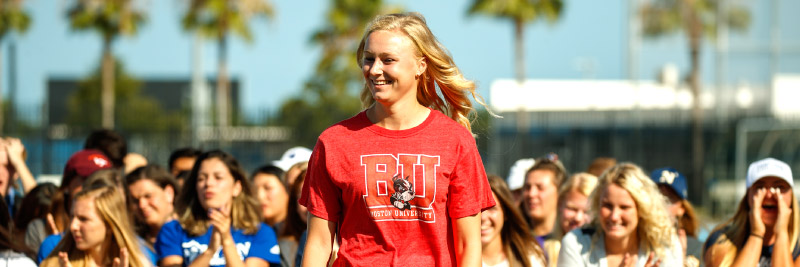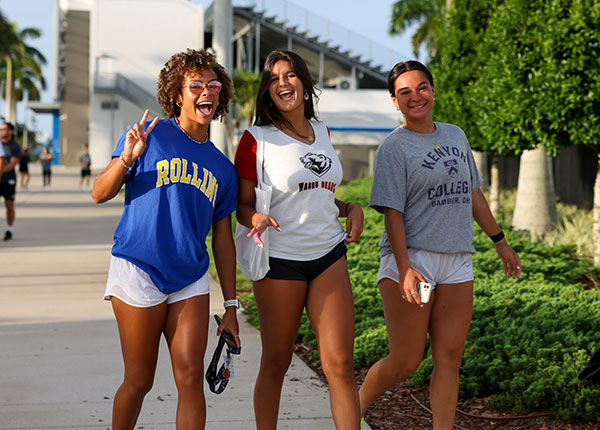Being the parent of a high school athlete can be tough. There’s the daily grind of getting them to practices, cleaning their uniform and traveling to games and events. Then you add on the financial expenses, like equipment, travel and fundraisers.
While you’re happy to do things to support your child, stress is often a common but unwanted byproduct in the hectic household of a student-athlete.
This page provides advice for parents on how to deal with common recruiting stressors, how to manage the financial burden of youth sports and what parents can do to keep their athlete on track and organized.
Plus, we’ve collected advice from real NCSA parents who have been in your shoes.
On This Page
Common stressors for parents and how to deal with them
The recruiting process is stressful; there’s no way around it. The entire process is centered on finding the perfect college match for your student-athlete and a decision as big as that comes with some stress.
In most difficult situations, understanding what lies ahead and knowing when exactly things might get bumpy, can help reduce some stress and better prepare you for the challenge.
Here are some of the questions in the recruiting process that commonly cause parents to stress out—and what you can do to make it better.
How do I find the right camps and recruiting events?
Too many parents waste money and time sending their kids to college camps that won’t help them get recruited.
While athletes occasionally get discovered at camps and showcases, most college coaches attend these events to evaluate recruits who are already on their list.
What to do:
As you and your child research camps, make sure coaches from their target schools will be in attendance.
Once you decide on a camp, have your child reach out to those coaches to get on their radar.
While any summer camp can help your child improve their skills and conditioning, the right one can help them make a key connection with a college coach.
You can search our list of camps, combines and other events to find opportunities near you here.
Where does My athlete stand with a college coach?
This is probably the most common problem families encounter during the recruiting process. You can’t read a coach’s mind, and with their busy schedules, parents can easily become frustrated by coach communication (or lack thereof).
This is why it’s important for student-athletes to be extremely proactive when emailing coaches their online recruiting profile, introducing themselves and expressing personalized interest in the program.
What to do:
The general rule is, after 5 unanswered emails/texts over several weeks, it is time to move on.
Encourage your child to stay in close communication with college coaches and then remind them that it’s their responsibility to follow up promptly.
But if a coach stops responding, let the athlete know that it’s okay to move on and focus on other programs that might be more interested in them.
Also, learn about the different types of emails and letters college coaches send, why they send them, and what they really mean. That way, you’ll know how to respond appropriately.
Access more tips on how to know if a coach is interested in your athlete.
Which division is right for My athlete?
Many athletes dream of playing at the Division 1 level, but it’s not always the realistic choice.
As your student-athlete begins to visit colleges and learn more about each division, they will see the many options they have outside Division 1 sports.
Parents can feel stressed when they don’t fully understand what options are out there and which one is best for their child.
What to do:
Have a third-party like NCSA, or your athlete’s current club or high school coach conduct an evaluation of their skill set and provide objective recommendations on which programs and divisions they should target.
They can also help your family gauge your athlete’s potential as they’ll most likely grow and develop throughout their high school career.
How Do I Help My Athlete create a recruiting video?
For most sports, video is an essential part of connecting with coaches, but it can be a challenge to collect footage and edit the best clips into one cohesive video.
If your athlete’s high school coaches don’t have game footage available, you may need to pay for a video service or try and record competitions yourself.
What to do:
Capturing highlight video footage isn’t as hard as you might think. As long as you have a tripod and know which kinds of plays to include, you can piece together a good reel.
Check out this page for more highlight video advice.
What Should I expect from financial aid and scholarships?

Full ride scholarships are rare, but that doesn’t mean your child can’t receive a competitive scholarship package, though.
D2 and NAIA offer athletic scholarships, and while D3 technically doesn’t provide athletic scholarships, coaches tend to work with the admissions office to create packages made up of grants and merit-based scholarships that are extremely attractive for student-athletes.
What to do:
First, you’ll need to fill out the FAFSA as soon as it’s available to understand how much aid your family will qualify for.
Then, you also want to learn about the facts around athletic scholarships and how much you’ll be expected to pay, so you can better prepare for what to expect.
Stress reducers and promoting positive physical and mental health
What’s the best way to reduce recruiting stress? The first step is to identify the root of your stress and then finding ways to address it.
Below are three common causes of stress during the recruiting process and our advice on how to handle each.
Being surrounded by negativity
How to avoid it:
Take a minute to step back from the pack and assess the individuals around you. Some parents focus on the negative, bringing down morale, while others are uber-competitive and constantly boasting about their child. Identify these parents and remove them from your circle.
Only surround yourself with those who are truly helpful as a sounding board, or sharing good advice, and generally have a better, healthier attitude toward playing sports.
Helicopter parenting
How to avoid it:
The college recruiting process is the perfect opportunity for young adults to find their independence and take responsibility over a major life decision.
In fact, when it comes to recruiting, college coaches love to see student-athletes who demonstrate they can stand on their own two feet and are not so reliant on mom and dad.
Rather than taking over the recruiting process and doing all of the work for your athlete, resume your role as part of your athlete’s support system and allow them to take ownership of their recruiting process. It’s a good test of whether they have a true passion and desire to play their sport in high school and beyond.
Learn more about helicopter parenting and how to avoid it.
Failing to research the college recruiting process
How to avoid it:
The better you understand how recruiting works, what options are available to you and your athlete, and your child’s college goals, the easier it is to strategize to make it happen.
Knowing the goal and what it takes to get there can takes away a lot of the fear and doubt and the stress that goes with it.
Learn more about the college recruiting process.
How to manage the stress of financial obligations of youth sports and recruiting
Raising a child today is expensive enough. Add on the cost of youth sports and it might feel like you’re draining your bank account to cover the cost of uniforms, equipment, tournament fees, summer camps and the list goes on.
While there’s no way around the cost of youth sports, there are ways you can minimize the cost. Below are a few tips to help you keep costs low, while still allowing your athlete to compete.
Establish a budget.
Be honest about your financial situation and what you’re able to afford. Setting a cap on how much you can allot to your athlete’s athletic career gives you a framework to work within.
Buy used.
While your athlete might not be thrilled about it, buying lightly used equipment is a great way to cut costs. Call on neighbors, friends and past teammates who might have equipment their child has outgrown. You can also find companies that buy and sell used sports equipment.
Volunteer or fundraise.
Volunteering a little bit of your time can go a long way. Some team and leagues will waive or reduce fees for parents who volunteer at games and other events. You can also talk to your child’s coach about doing a team fundraiser to help raise money and cover team expenses.
Find local camps and tournaments.
Unless you live in a rural area, most athletes shouldn’t have to drive far to find quality competition. To keep costs low, find local camps and tournaments for your athlete to compete in. That way you don’t have to pay for hotels, eating out and any other travel expenses.
If you do live in a rural area, you’ll need to be even more strategic about selecting camps and tournaments. Focus on camps in major cities nearby that you know coaches from your athlete’s target list will be attending.
Learn more about camps and getting invites from college coaches.
Work with other parents.
You’re likely not the only parent trying to save money. Work with other parents to establish a carpool schedule, split the cost of private lessons and share hotel rooms when on the road for recruiting events.
Look for discounts.
Most summer camps will offer early-bird discounts or promo codes for athletes registered with different organizations. Keep an eye out for these promotional emails and don’t hesitate to register as soon as they are available.
How to help your athlete stay organized
The recruiting process is a lot to put on one person’s plate, especially for a high school student-athlete who is already juggling academics, athletics and their social life.
Helping your child stay organized is a great way to support your athlete “behind the scenes” so they can shine when it’s time to communicate with college coaches.
Here are a few ways you can keep your athlete organized through the recruiting process:
Teach your athlete time management.
This is a valuable tool for athletes to have now and in the future. Help them establish a routine based on their day-to-day schedule and encourage them to stick to it.
Athletes should start their day by setting goals and priorities for the day. This will help them focus on one task at a time based on its importance.
While there’s a lot of work to be done, make sure your athlete finds time to take breaks and socialize with family and friends.
Create and manage a master list.
Every athlete should have a master list of the schools they are interested in.
With NCSA Favorites, athletes are able to “Favorite” schools to create a personalized list of target programs that are recruiting their position. NCSA Recruiting Profiles have the ability to “favorite” programs and save them to your digital list of target schools.
You can also keep track of your athlete’s progress with each of the schools they are talking to in a master spreadsheet.
Because you’ll likely find yourself at different points in the recruiting process with each college, it’s important to track all of their coach communication and likes and dislikes about the school.
You can also use this spreadsheet to make basic notes about each school, such as tuition cost, location, size, etc.
Let your athlete delegate tasks.
Yes, your athlete should do most of the recruiting work, but that doesn’t mean you can’t step in to help with more behind the scenes tasks. This includes proofreading emails, role playing to practice for calls with coaches and helping them research colleges.
You can also build a relationship with their high school or club coach, and even their high school counselor, to really get an understanding of their options and which colleges you can add to their target list and start researching.
Recruiting advice from parents to parents
There’s no one better to give advice than parents who have been in your position. We asked NCSA parents, “What advice would you give to parents just starting the recruiting process?”
Below are some of the responses we received:
“Avoid the ‘D1 or Bust’ mentality. Every level is competitive. And some D2 or D3 or JUCO or NAIA teams are every bit as tough as some D1s. Only 7% of all HS students go on to play in college at all.”
“Promote accountability in your child(ren) to start the process early and give them the control. It’s not easy at first, but over time they will be much more independent and ready to make that leap.”
“[Recruiting] is a business and it can be stressful. Make sure your child has stress relief time (with friends and family) instead of just playing their sport and studying!”
“Be realistic. Help your athlete find their perfect fit academically, financially and in a team culture. Just because they can get into a school doesn’t mean they should go there.”
“My daughter is on an athletic scholarship for basketball and we learned 3 things. 1) Choose a school that the student would like if they didn’t play sports. 2) Only play for a coach that loves the athlete. 3) Need to be able to commit to what is expected of you.”
“Make sure your child has a Twitter account and is following the coaches and schools they’re interested in. Post videos to it regularly. Teach your child how to compose a proper email and send at least one email per week to schools they’re interested in. It doesn’t always have to be stats or highlights. Write them about how your week at school went, how you aced that exam, what your life outside of sports consists of. Coaches love that stuff.”
“Grades open the bigger doors and there’s more opportunity for financial aid/scholarships. Don’t put all the burden on an athletics program.”
NCSA Can Help
You don’t have to do it all on your own. We can help you and your family navigate the recruiting process wherever you are in your journey and wherever you want to go.
Check out an ncsa workshop
Want to learn more? Our workshops are the perfect way to brush up on your knowledge. Click here for the full list of educational workshops or explore the ones featured below.



